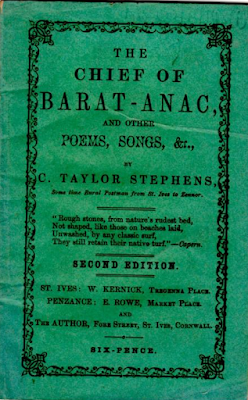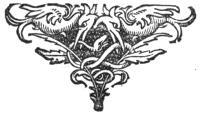The Pilot’s Ghost Story
 St Ives Harbour Fish Market: courtesy of https://www.cornwalls.co.uk
St Ives Harbour Fish Market: courtesy of https://www.cornwalls.co.ukAnother tale from RobertHunt’s ‘Popular Romances of the West ofEngland, or The Drolls, Superstitions and Traditions of Old Cornwall’ (thirdedition, 1896) was told orally to Charles Taylor Stephens, a poet and ‘sometime ruralpostman from St Ives to Zennor’. Hunt employed Stephens to collect stories fromremote villages on the assumption that people would more readily tell tales tothe friendly postman than to a stranger.
 C. Taylor Stephens' book of poems
C. Taylor Stephens' book of poemsThis particular story was told toStephens by a pilot whose job it was to meet ships and guide them into port. Inthis tale he guides the sloop Sallyfrom St Ives to Hayle, approximately five miles up the coast.
Robert Hunt often altered stories‘from the vernacular – in which they were for the most part related – intomodern language’, but says of this one, ‘I prefer giving this story in thewords in which it was communicated. For its singular character, it is a ghoststory well worth preserving.’
Here it is, in what is (mostly) the pilot's own words.

Just seventeen years since*, Iwent down on the wharf from my house one night [between] about twelve and onein the morning, to see whether there was any ‘hobble,’* and found a sloop, the Sally of St Ives (the Sally was wreckedat St Ives one Saturday afternoon in the spring of 1862) in the bay, bound forHayle.
When I got by the White Hartpublic-house, I saw a man leaning against a post on the wharf – I spoke to him,wished him good morning, and asked him what o’ clock it was, but to no purpose.I was not to be easily frightened, for I didn’t believe in ghosts, and findingI got no answer to my repeated inquiries, I approached close to him and said,‘Thee’rt a queer sort of fellow, not to speak; I’d speak to the devil, if he wereto speak to me. Who art a at all? thee’st needn’t think to frighten me: thatthee wasn’t do, if thou wert twice so ugly; who art a at all?’
He turned his great ugly faceon me, glared abroad his great eyes, opened his mouth, and it was a mouth sure ’nuff. Then I sawpieces of sea-weed and bits of sticks in his whiskers; the flesh of his face andhands were parboiled, just like a woman’s hands after a good day’s washing.Well, I did not like his looks a bit, and sheered off; but he followed close bymy side, and I could hear the water squashing in his shoes every step he took.
Well, I stopped a bit, andthought I would be civil to him, and spoke to him again, but no answer. I thenthought I would go to seek for another of our crew, and knock him up to get thevessel, and had got about fifty or sixty yards, when I turned to see if he wasfollowing me, but saw him where I left him.
Fearing he would come afterme, I ran for my life the few steps that I had to go. But when I got to thedoor, to my horror there stood the man in the door, grinning horribly. I shooklike an aspen leaf; my hat lifted from my head; the sweat boiled out of me.What to do I didn’t know, and in the house there was such a row, as ifeverybody was breaking up everything. After a bit I went in, for the door wason the latch [ie: not locked] – and called the captain of the boat, and gotlight, but everything was all right, not had he heard any noise.
We went out aboard of the Sally and I put her into Hayle but Ifelt ill enough to be in bed. I left the vessel to come home as soon as Icould, but it took me four hours to walk two miles, and I had to lie down inthe road, and was taken home to St Ives in a cart; as far as the Terrace* fromthere I was carried home by my brothers and put to bed. Three days afterwardsall my hair fell out as if I had had my head shaved. The roots, and about halfan inch from the roots, being quite white. I was ill six months, and doctor’sbill was £4, 17s. 6d. for attendance and medicine. So you see I have reason tobelieve in the existence of spirits as well as Mr Wesley* had. My hair grewagain, and twelve months after I had as good a head of dark-brown hair as ever.
Notes:
* ‘Just seventeen yearssince’: Stephens, to whom it was told,died in 1865, so the events of the story must have occurred by 1848 or earlier.
* ‘hobble’ – dialectword a Cornish glossary says is ‘the share each person received when the vessel was brought in - or perhaps when the catch was sold.’ The sense here seems to be ‘a share of any work to do’?
* ‘TheTerrace’ is a street in St Ives with views over the bay.
* The preacher John Wesley believedin the existence of ghosts and other spirits.




